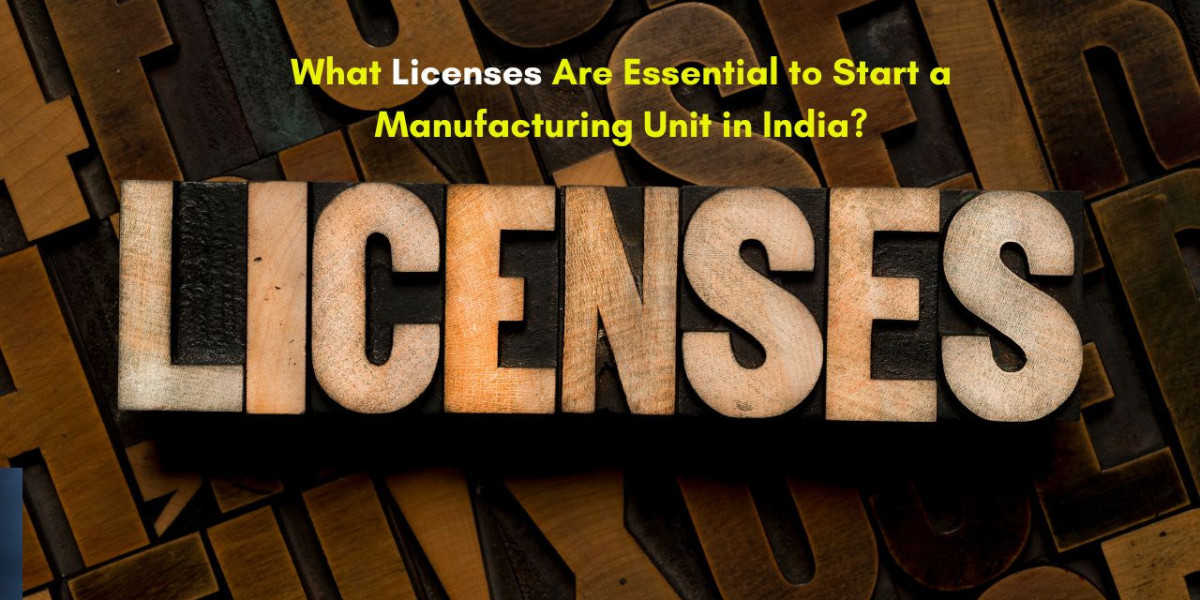Introduction
Starting a manufacturing unit in India requires thorough legal and regulatory framework knowledge to ensure smooth operations and compliance with government mandates. Manufacturing units must obtain several licenses and certifications to operate within legal boundaries, maintain product standards, and protect consumer interests. In this blog, we will explore the various licenses and registrations required to start a manufacturing business in India, covering everything from ISO registration to trade licenses and industry-specific certifications.
ISO Registration for Manufacturing Units
One of the most important certifications for a manufacturing unit in India is ISO registration. The International Organization for Standardization (ISO) provides globally recognized standards that help businesses meet quality, safety, and efficiency requirements. ISO certification not only improves a company's reputation but also enhances customer confidence in its products.
To obtain ISO registration, manufacturers must follow a set of protocols and guidelines that ensure the standardization of their processes. It involves a thorough audit of business operations to ensure compliance with international standards. For manufacturing units, ISO company registration serves as a mark of quality, helping them gain a competitive edge in both domestic and international markets.
The process of ISO registration involves selecting the appropriate standard relevant to the manufacturing unit, preparing documentation, conducting internal audits, and undergoing an external audit from a certified body. Once the audit is successful, the manufacturing unit is granted ISO registration, which needs periodic renewal to ensure ongoing compliance.
Trade License: The Importance of BBMP Trade License
A trade license is a critical requirement for manufacturing units in India to ensure that the business operations comply with the local laws. The Bruhat Bengaluru Mahanagara Palike (BBMP) is the authority responsible for issuing trade licenses within the Bengaluru region. A BBMP trade license is mandatory for any manufacturing unit operating in the area. This license ensures that the business meets the necessary health, safety, and environmental regulations.
To apply for a BBMP trade license, manufacturers need to gather several key documents. The BBMP trade license documents required typically include proof of business ownership, property tax receipts, site plans, and NOC from the local fire department. The application process also involves a fee based on the size and nature of the manufacturing unit. Businesses need to renew their trade licenses annually to avoid penalties.
Without a valid trade license, a manufacturing unit may face legal challenges, including the risk of being shut down by the authorities. Hence, obtaining and maintaining a BBMP trade license should be a top priority for anyone starting a manufacturing unit in Bengaluru.
MSME Registration: Supporting Small Manufacturing Units
Manufacturing units falling under the category of Micro, Small, and Medium Enterprises (MSME) must register with the Ministry of MSME to take advantage of various government schemes and subsidies. MSME registration helps small manufacturers access credit at lower interest rates, participate in government tenders, and gain protection against delayed payments.
While not mandatory, MSME registration provides several advantages to small manufacturers, including tax exemptions and subsidies. It also helps in gaining credibility with customers and suppliers, as MSME-registered businesses are recognized for their contribution to the Indian economy.
ZED Certification: Promoting Sustainable and Efficient Manufacturing
The Zero Defect, Zero Effect (ZED) certification is a government initiative aimed at promoting sustainable manufacturing practices. Manufacturing units that want to emphasize quality while minimizing environmental impacts should consider obtaining ZED certification. This certification not only improves operational efficiency but also enhances the brand image by showcasing a commitment to quality and sustainability.
The MSME ZED certification is particularly beneficial for small and medium enterprises (SMEs) in the manufacturing sector. It encourages businesses to adopt advanced technology, reduce waste, and improve resource management. To obtain ZED certification, manufacturing units must undergo an audit that evaluates their production processes, environmental impact, and adherence to quality standards.
Manufacturers who obtain ZED certification are eligible for various government incentives, including financial assistance and support in marketing their products. This certification is an important tool for MSMEs looking to expand their operations and compete globally.
Pollution Control Board Clearance
Manufacturing units often have a significant environmental impact, especially in terms of waste generation and emissions. To mitigate this, manufacturers need to obtain clearance from the State Pollution Control Board (SPCB). This clearance is essential for units that discharge pollutants into the air or water.
The process of obtaining pollution control clearance involves submitting detailed plans on waste management, air and water pollution control measures, and compliance with environmental laws. Manufacturing units must ensure they adhere to the prescribed standards to avoid penalties and closure of operations.
Factory License
A factory license is another crucial requirement for starting a manufacturing unit in India. The Factories Act, 1948 mandates that any establishment engaged in manufacturing activities must obtain a factory license. This license ensures that the manufacturing unit complies with labor laws, safety standards, and working conditions for employees.
The process of obtaining a factory license involves submitting detailed information about the manufacturing facility, including the number of workers, machinery, and safety measures in place. The state government issues the license and needs to be renewed periodically.
Building and Fire Safety Permits
Manufacturing units must also obtain building and fire safety permits to ensure their facilities meet safety standards. Local authorities issue these permits and involve inspections to verify that the manufacturing unit has adequate fire safety measures, such as fire extinguishers, alarms, and evacuation plans.
Failure to comply with fire safety regulations can lead to legal action, fines, and even the closure of the manufacturing facility. It is essential for manufacturers to regularly review and update their safety protocols to ensure compliance.
Pesticide License for Agriculture-Related Manufacturing
For manufacturing units involved in producing or handling pesticides, a pesticide license is essential. The pesticide industry is heavily regulated to ensure the safety of consumers and the environment. Without proper authorization, manufacturers cannot produce, store, or sell pesticides.
The process of obtaining a pesticide license involves meeting certain qualifications. For instance, the pesticide shop licence qualification mandates that applicants must have the required education and expertise in handling pesticides. In addition, they must comply with regulations regarding the storage and distribution of these chemicals. Manufacturing units dealing in pesticides need to ensure they meet all regulatory requirements and maintain their licenses to avoid legal issues.
A pesticide license ensures that manufacturers are producing and selling pesticides that meet government safety standards, protecting both human health and the environment. Any violation of the terms of the pesticide license can lead to severe penalties, including revocation of the license and legal prosecution.
Conclusion
Starting a manufacturing unit in India requires a well-rounded understanding of the legal, regulatory, and environmental requirements. From ISO company registration to trade licenses, pesticide licenses, and ZED certification, manufacturers must ensure that they obtain the necessary permits to operate legally and efficiently. Additionally, complying with environmental laws and safety regulations is critical to ensuring the long-term success of the manufacturing unit. By securing these essential licenses and certifications, manufacturers can focus on scaling their operations and building a sustainable, legally compliant business.








